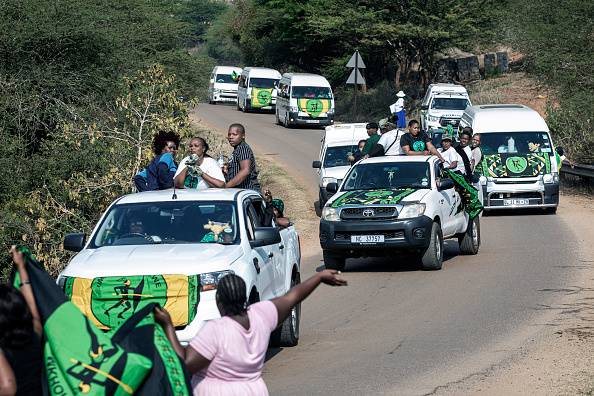
Supporters of Jacob Zuma's Umkhonto weSizwe party (MK) celebrate in KwaSimba on June 2, 2024 after winning about 46% of the vote in KwaZulu-Natal and about 15% nationwide. (Photo by Per Anders Pettersson/Getty Images)
The Independent Electoral Commission (IEC) announced on Sunday night that KwaZulu-Natal had the highest voter turnout in the country.
More than 1.58 million voters (45.35%) cast their ballots for Jacob Zuma's newly founded MK party in the provincial election, giving the party more than double the support of the IFP, which received 631,503 votes (18.03%).
The ANC came third with 595,421 votes (17%), followed by the Democratic Alliance with 468,484 votes (13.38%), the Economic Freedom Fighters with 79,168 votes (2.26%) and the National Liberal Party with 19,534 votes (0.56%). Moodley Thanasagleng Rubanathan, the only independent candidate standing in the province, received 12,323 votes (0.35%).
In the national vote, over 1.6 million voters (45.93%) supported MK, more than twice as many votes as the ANC, which received 618,811 votes (17.64%). The Inkatha Freedom Party came third with 570,225 votes (16.26%), followed by the Democratic Alliance with 479,357 votes (13.67%).
The picture was similar in the local government elections, with MK winning 1,570,704 votes (44.89%), the IFP 638,242 votes (18.24%), the ANC 602,989 votes (17.24%), the DA 471,805 votes (13.49%), the EFF 83,430 votes (2.38%), the NFP 20,702 votes (0.59%) and the ACDP 11,583 votes (0.33%).
These were some of the election results announced by IEC Provincial Manager for Electoral Affairs Sandile Maphumulo on Sunday night.
Maphumulo said a total of 3,565,809 voters cast their national ballots, with 58,266 invalid votes, while a total of 3,542,343 voters cast their provincial ballots, with 39,679 invalid votes. A total of 3,535,618 voters cast their local ballots, with 36,993 invalid votes in this area.
IEC provincial executive officer Ntombifuti Masinga said a total of 5.9 million of each ballot paper had been printed to ensure there were enough votes for all 5.7 million registered voters if they turned up to vote on election day.
She said IEC staff worked hard to ensure the polls went smoothly under difficult circumstances, staying up until 4am on Sunday morning to deal with objections.
“People expected the province to burn down at some point, but that didn't happen and the elections took place,” Masinga said.
KwaZulu-Natal Premier Nomsa Dube-Ncube said the 39,679 invalid votes in the provincial election were of concern as they roughly equated to seats lost by political parties.
Dube-Ncube congratulated people of the state for turning out in large numbers to vote on election day.
“I also want to commend all the residents of this state because our voter turnout was the highest in the country, at 61 percent, and even exceeded the national average,” she said.
“This is a defining moment for our nascent democracy. Today, our nation stands at a critical crossroads. The people have made their voices heard, and we are now agents of the greater impact of every vote cast in the coming days.
Dube-Ncube said the country's democracy had “proven to be resilient.”
“That is because, as we prepare to welcome our seventh government since our 1994 breakthrough, our people have been able to express their wishes without fear in an environment of political tolerance that is among the highest in the world. We continue to set the standard for managing such processes,” she said.

